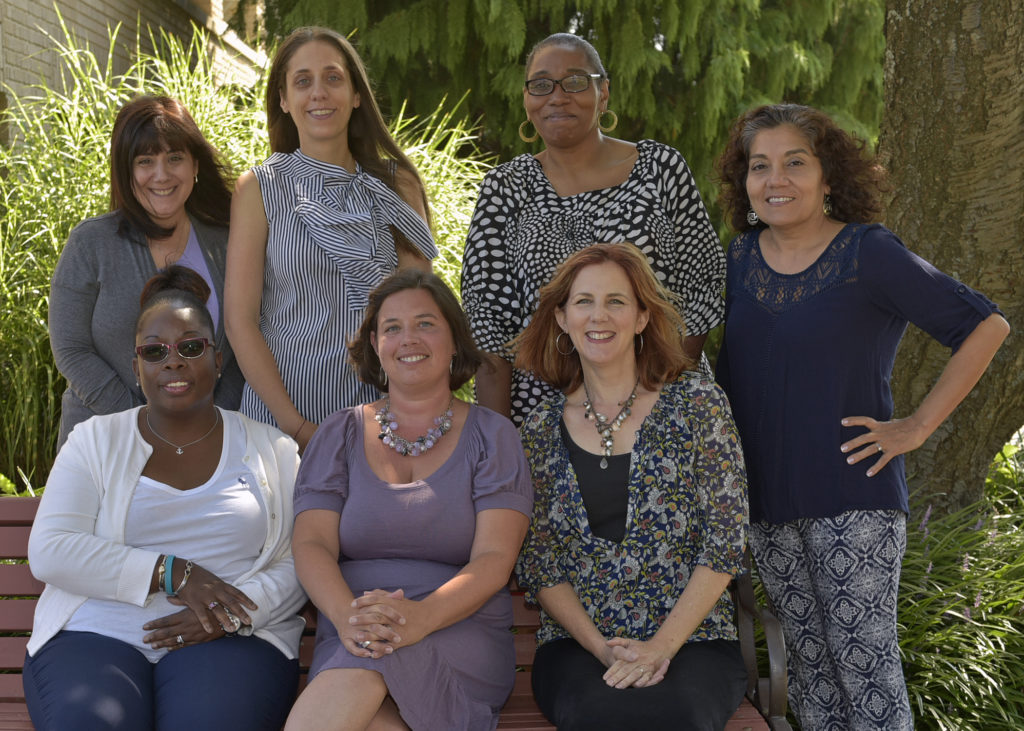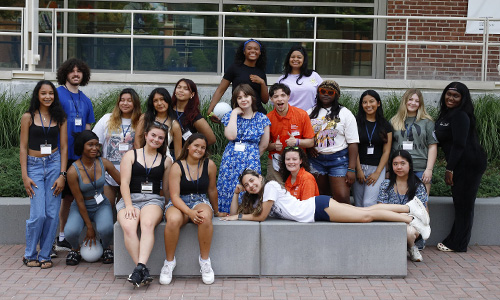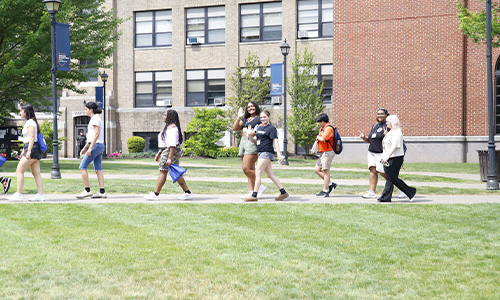Search WCSU
WCSU Essentials
Social Work
School of Professional Studies
WCSU's Department of Social Work
Becoming a social work major is the first step to becoming a social work professional.
Our social work students graduate from WCSU with the knowledge, skills, and professional identity to enter the workforce with confidence.
Majoring in a Profession
Social work students take a variety of classes that prepare them to become macro and micro practitioners in the field of social work. Our students graduate with skills that prepare them to go on to Masters degree programs or to go into the workplace as case managers, community social workers, political advocates, child protective service workers, and many other positions. Preparing students for a professional life as a social worker happens in the classroom, in their junior and senior field internships, and in our many supplemental activities that happen each semester.
In the Fall, newcomers to the social work major start off the semester at an orientation where they learn about the program and what to expect as a social work major. The Social Work Expo is held every September where students can meet with admissions counselors from Masters of Social Work programs from across the region and beyond. At this event, they can also can practice their job interviewing skills and meet with local social work employers. Also in September is our annual Professional Development Day Conference which brings together all social work majors to discuss important issues facing social workers. Students also can expect special workshops to be held during class time covering topics such as professional burn-out prevention, resume writing, and career preparation.
Each year, a Community Action Poverty Simulation is held by the Department of Social Work which engages students in learning about the day to day challenges of those living in poverty. In the spring, students will participate in the Bea Nemzer Social Work Symposium where a recognized social worker addresses students and community members about current social work topics. Students in the social work major can join the social work club which provides service and leadership opportunities. We also host a chapter of Phi Alpha, a national social work honor society. Phi Alpha membership is selective, based on GPA and members also engage in community volunteerism. You will find social work majors also participate in leadership and service in the larger university community through Greek life, student government, and student clubs. Each May, our seniors are honored with a transition ceremony where professors and students gather to reflect over the successes of the past four years and celebrate the beginning of each student’s professional life.

WCSU is Accredited by the
Council on Social Work Education

WCSU is Accredited by the
Council on Social Work Education

Contact Us
Department of Social Work
Western Connecticut State University
181 White Street, White Hall 101
Danbury, CT 06810
PHONE: (203) 837-8410
FAX: (203) 837-8945
Department Chair:
Karen McLean
Email: brownk@wcsu.edu
Department Secretary:
Katie Maxwell
Email: maxwellk@wcsu.edu
Undergraduate Admission
Office of Undergraduate Admissions ➔
email: admissions@wcsu.edu
phone: (203) 837-9000

Contact Us
Department of Social Work
Western Connecticut State University
181 White Street, White Hall 101
Danbury, CT 06810
PHONE: (203) 837-8410
FAX: (203) 837-8945
Department Chair:
Karen McLean
Email: brownk@wcsu.edu
Department Secretary:
Katie Maxwell
Email: maxwellk@wcsu.edu
Undergraduate Admission
Office of Undergraduate Admissions ➔
email: admissions@wcsu.edu
phone: (203) 837-9000
Bringing about positive social change.
Degree Programs
New Student FAQ
Who will help me pick my classes?
All social work majors are assigned an advisor. Your advisor will meet with you once a semester to help you select your classes and answer any questions you have about the program or the profession of social work. You are encouraged to meet with your advisor any time you have concerns or need a little help along the way. Your advisor is your go-to person in the social work faculty. You can find out who your advisor is by looking at your My Banner page. Feel free to email them to say hello!
How will I find about about important dates and department news?
All Department of Social Work students are required to have a WestConn e-Mail account. Students are advised to check their e-mail frequently for announcements and communications including information about important events, meetings, scholarships, current courses, new courses, and application deadlines for Professional Level 1 and 2. The Department will communicate with students through Blackboard and the WestConn e-mail system, and not through students’ personal e-mail addresses.
What is Professional Level 1 and when do I apply?
Although you may be a social work major, you will need to apply to the program in order to move on to the internship stage of the program. Your first field placement internship will be the spring of your junior year. You will apply for Professional Level 1 the fall of your junior year. In order to be accepted into PL1 there are GPA requirements and course criteria that must be met. Please discuss these with your advisor and look them over in the Social Work Program Requirements. Our class size is limited by the availability of field placements in the community. This means it is a competitive program and acceptance into the program is not guaranteed.
Top 3 Reasons our Students Love the Social Work Program at WCSU
The Professors
“The professors and peers are all amazing people. They are super helpful and are all passionate about social work. Each professor has worked in different fields and can provide real life examples and experiences into your courses.”
The Students
“I appreciate the camaraderie that is built between classmates as well as the relationships we develop with the professors. Being able to feel comfortable with everyone makes discussions and just classes in general more enjoyable!”
The Learning Environment
“The smaller classroom sizes makes it easier to learn and to get questions answered. All of the professors are passionate about their jobs. The internships are a great opportunity to learn skills while being a student.”
WCSU Social Work Graduates
Shelby Davis
B.A. Social Work, ’08
Shelby Davis
Executive Director for City Youth Theater in Waterbury and a counselor for Waterbury public schools
“WCSU built a foundation for my leadership. Keep going – stick to your dreams, your goals, your vision. The road may be long, but you will get there.”
Deanna Melillo, LMSW
B.A. Social Work, ’21
Deanna Melillo, LMSW
Works at an agency called Kids in Crisis and Western Middle School, employed through Kids in Crisis.
“After graduating, I went straight back to school and received my Master’s Degree in Social Work in eight months. Upon graduating with my MSW, I took my LMSW licensing exam and passed in the state of Connecticut. I have just recently received my LMSW license in the state of New York as well. I am so thankful that my chosen career path is socia I work, as I love to help others and give back to the communities and people that need it the most.”
Nary Rath
B.A. Social Work, ’18
Nary Rath
“WCSU jump started my amazing and fulfilling career as a social worker. Since graduating from WCSU, I earned my master of social work; completed a fellowship in Washington, D.C., in the U.S. Senate; and relocated to California to work in my dream job advocating for the Southeast Asian community as California Program Manager for the Southeast Asia Resource Action Center (SEARAC).
- Mission
-
Mission
The Department of Social Work at Western Connecticut State University prepares highly competent generalist social workers to practice as professionals and leaders in a manner consistent with the purposes and values of the profession. The Department builds upon a liberal arts education by creating opportunities for internships, research, and experiential learning that ignite a desire for life-long learning.
––––––––––––––––––
The Department of Social Work at Western Connecticut State University, in keeping with the Mission of the University, seeks to educate a diversified student body and serves as an accessible, responsive, and creative intellectual resource.
The Department of Social Work provides a quality of education that prepares informed, culturally sensitive, skilled generalist social workers, who will provide services that promote and strengthen the well-being of individuals, families, groups, organizations, and communities, and that are consistent with the values and ethics of the profession.
The program operates dynamically in the context of the broad liberal arts education and the particular social service needs of the region.
- Learning Outcomes
-
Learning Outcomes
Social Work students’ competency-based learning outcomes are measured across ten competency areas as specified by the Council on Social Work Education (CSWE) Standards of Accreditation and Educational Policy Standards (EPAS). A detailed description of EPAS and results of the annual assessment of students’ learning outcomes are available at www.wcsu.edu/sw.
Competency 1—Demonstrate ethical and professional behavior.
Competency 2—Engage diversity and difference in practice.
Competency 3—Advance human rights and social, economic, and environmental justice.
Competency 4—Engage in practice-informed research and research-informed practice.
Competency 5—Engage in policy practice.
Competency 6—Engage with individuals, families, groups, organizations and communities.
Competency 7—Assess individuals, families, groups, organizations and communities.
Competency 8—Intervene with individuals, families, groups, organizations and communities.
Competency 9—Evaluate practice with individuals, families, groups, organizations, and communities.
Mission
The Department of Social Work at Western Connecticut State University prepares highly competent generalist social workers to practice as professionals and leaders in a manner consistent with the purposes and values of the profession. The Department builds upon a liberal arts education by creating opportunities for internships, research, and experiential learning that ignite a desire for life-long learning.
––––––––––––––––––
The Department of Social Work at Western Connecticut State University, in keeping with the Mission of the University, seeks to educate a diversified student body and serves as an accessible, responsive, and creative intellectual resource.
The Department of Social Work provides a quality of education that prepares informed, culturally sensitive, skilled generalist social workers, who will provide services that promote and strengthen the well-being of individuals, families, groups, organizations, and communities, and that are consistent with the values and ethics of the profession.
The program operates dynamically in the context of the broad liberal arts education and the particular social service needs of the region.
Learning Outcomes
Social Work students’ competency-based learning outcomes are measured across ten competency areas as specified by the Council on Social Work Education (CSWE) Standards of Accreditation and Educational Policy Standards (EPAS). A detailed description of EPAS and results of the annual assessment of students’ learning outcomes are available at www.wcsu.edu/sw.
Competency 1—Demonstrate ethical and professional behavior.
Competency 2—Engage diversity and difference in practice.
Competency 3—Advance human rights and social, economic, and environmental justice.
Competency 4—Engage in practice-informed research and research-informed practice.
Competency 5—Engage in policy practice.
Competency 6—Engage with individuals, families, groups, organizations and communities.
Competency 7—Assess individuals, families, groups, organizations and communities.
Competency 8—Intervene with individuals, families, groups, organizations and communities.
Competency 9—Evaluate practice with individuals, families, groups, organizations, and communities.

Contact Us
Department of Social Work
Western Connecticut State University
181 White Street, White Hall 101
Danbury, CT 06810
PHONE: (203) 837-8410
FAX: (203) 837-8945
Department Chair:
Karen McLean
Email: brownk@wcsu.edu
Department Secretary:
Katie Maxwell
Email: maxwellk@wcsu.edu
Undergraduate Admission
Office of Undergraduate Admissions ➔
email: admissions@wcsu.edu
phone: (203) 837-9000





